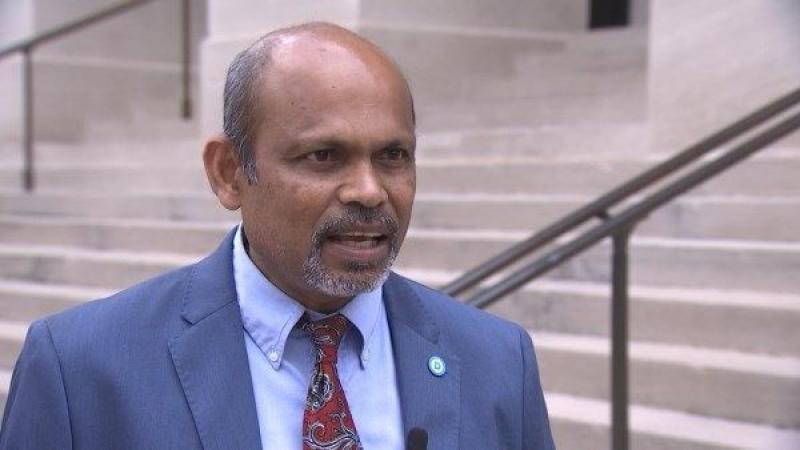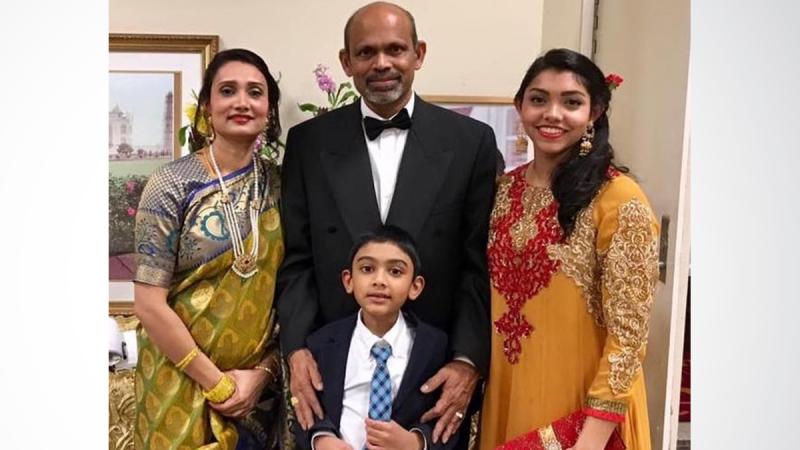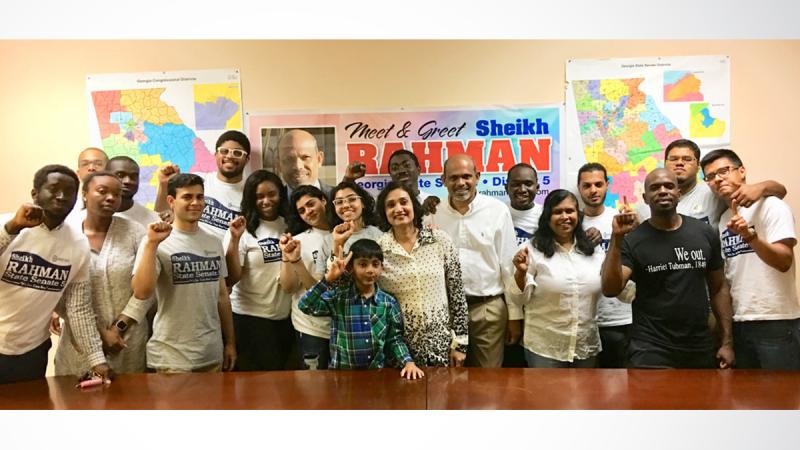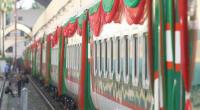 Sheikh Rahman is not new to politics. He had nursed ambitions to hold positions within the Democratic Party since the days he worked on a Democratic campaign in the early eighties.
Sheikh Rahman is not new to politics. He had nursed ambitions to hold positions within the Democratic Party since the days he worked on a Democratic campaign in the early eighties.
Yet, by his own admission, he never saw himself running for office, and that too in the deep red state of Georgia. It was only after Barack Obama became the first African-American to conquer the White House, he felt that "someday even I could get elected".
On the morning of Nov 7, Rahman, too, like his hero Obama, will have a few firsts added to his name. He will be the first Muslim to enter the Georgia state senate and also the first Bangladeshi-American to be elected to any state senate in the United States.
“It feels great,” he says, adding, “It’s a dream come true. Life has already changed, no doubt about that.”
Rahman’s place in the senate was practically assured in the early summers when he beat his opponent in the Democratic Party Primary--an election where Democrats and Republicans vote to choose their party candidate. Since there is no Republican candidate running against him in the Nov 6 midterm election, his place is already secured.
He will be representing a district that’s considered the most diverse in Georgia and the third most diverse district in the country, a demographics that could have propelled him to victory. The population is 38 percent white, 27 percent black, 21 percent Hispanic and 11 percent Asian. Rahman admits there are two shades of Georgia—one rural and deep red, the other urban and diverse — but maintains that his victory wasn’t because of any one particular community.
Rahman admits there are two shades of Georgia—one rural and deep red, the other urban and diverse — but maintains that his victory wasn’t because of any one particular community.
“I’m mainstream, and I mean it. Close to 97 percent of my votes came from traditional White, Black and Hispanic voters,” he says. There are about 300 Bangladeshi-American votes in his constituency and he says he got just about half of it.
Rahman believes that Democrats need to compete even in areas which are supposedly "hardcore red".
"Some of us may look different, but we have to challenge with ideas. People need to see us and understand what we stand for," he says.
This is a success story that has been decades in the making. He comes from an affluent family in Bangladesh but worked as a dish-washer at a restaurant to pay for his college. He took up jobs like roofing and work that meant real hard labour and also managed a pizza-chain. He eventually got a degree in business from the University of Georgia.
Having landed in the United States at the peak of the Iran hostage crisis, he faced racist taunts and what he calls the "sting of xenophobia".
“Go home rag head, they would shout at me,” he recalls.
"But I knew that if I worked hard, nothing would be impossible in this country," he says. He became a delegate for President Obama during his re-election campaign in 2012 and later in 2016 got elected to the state Democratic Party's executive committee.
He became a delegate for President Obama during his re-election campaign in 2012 and later in 2016 got elected to the state Democratic Party's executive committee.
Rahman's success story resonates with many in the Bangladeshi-American community, one of the fastest growing communities in the United States, and is a proud moment for many. He, however, feels that the time has come for more and more young Bangladeshi-Americans to get involved in mainstream politics.
"I see young Bangladeshi-Americans who haven't even registered to vote. Even their parents think that their children have become doctors and engineers and they have already achieved their American dreams so why bother," he says.
He fears that despite all the successes, the country could be headed back to the days he faced as a youngster.
"We have come a long way. But after Trump's victory things seem to be going back," he says.
His message for the younger generation is: "We shouldn't be scared. Immigrants can do it and you have a far better opportunity than I ever had."
 Others
Others
30885 hour(s) 39 minute(s) ago ;
Afternoon 04:33 ; Thursday ; Apr 25, 2024
From dish-washer to state senate, an American dream comes true in Georgia
Send
Brajesh Upadhyay, Washington
Published : 10:50, Nov 03, 2018 | Updated : 10:51, Nov 03, 2018
Published : 10:50, Nov 03, 2018 | Updated : 10:51, Nov 03, 2018
0 ...0 ...
/pdn/
Topics: Top Stories
- KOICA donates medical supplies to BSMMU
- 5 more flights to take back British nationals to London
- Covid19: Rajarbagh, Mohammadpur worst affected
- Momen joins UN solidarity song over COVID-19 combat
- Covid-19: OIC to hold special meeting
- WFP begins food distribution in Cox’s Bazar
- WFP begins food distribution in Cox’s Bazar
- 290 return home to Australia
- Third charter flight for US citizens to return home
- Dhaka proposes to postpone D8 Summit
Unauthorized use of news, image, information, etc published by Bangla Tribune is punishable by copyright law. Appropriate legal steps will be taken by the management against any person or body that infringes those laws.
Bangla Tribune is one of the most revered online newspapers in Bangladesh, due to its reputation of neutral coverage and incisive analysis.
F R Tower, 8/C Panthapath, Shukrabad, Dhaka-1207 | Phone: 58151324; 58151326, Fax: 58151329 | Mob: 01730794527, 01730794528


